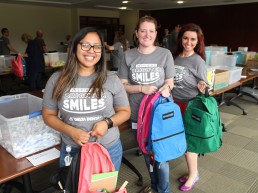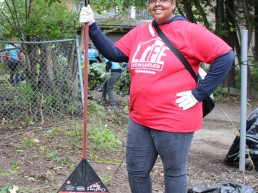'That day we were just like everyone else’
Natalie Anwar is used to the stares, gawking and feelings of judgment when she goes out in public with her triplets with autism.
“I’m a single black mom with boys who don’t behave,” says Natalie, whose 12-year-old sons, Aidan, Braden and Jaden, were diagnosed with autism spectrum disorder (ASD) at age 3. “I always feel like someone is watching me, stereotyping me, judging me. I usually don’t have the energy to deal with it. So we just don’t go anywhere.”
Then Natalie learned about low-cost sensory-friendly theater performances at the Wharton Center for the Performing Arts at Michigan State University.
Delta Dental invested in the series to make live theater accessible to about 2,000 individuals with special needs and their families.
Natalie, who lives with her mother in DeWitt, Michigan, took all five of her boys, including the two without ASD, and another adult to the productions of “Clementine” and “The Lion King.” “The Cat in the Hat” was also part of the series.
Never in a million years would I have done it if not for the sensory-friendly program. That day we were just like everyone else; it was surreal.
—Natalie Anwar

About 1,400 families with loved ones on the spectrum attended “The Lion King,” which was for many the first live theater performance during which they felt accepted and supported.
The theater bustled with activity throughout the show, including squealing, shouting and dancing. Some attendees walked the aisles; others ate, fidgeted or played on tablets. Many families did a walk-through before the performance so they knew what to expect; others engaged in art and other activities ahead of time to prepare for the experience. Some never left the quiet room that was available for families who needed a break.
Natalie’s children had issues that day, unrelated to the performance. But she was able to manage them with the help of staff and volunteers. And she said the best part was that she felt welcomed even when her children acted out.
“Never in a million years would I have done it if not for the sensory-friendly program,” she says. “That day we were just like everyone else; it was surreal.”
What’s the difference?
Sensory-friendly performances reduce triggers and lower stimulation for people with autism spectrum disorder, developmental disabilities, sensory processing disorder and other sensory sensitivities. They differ from regular performances in the following ways:
- Lower sound and light levels; all strobe light effects removed
- House lights on low throughout the performance
- Audience members are welcome to stand, move around, and enter and leave the theater as needed
- An area with crafts and activities for engagement
- Designated quiet and calm spaces
- Autism specialists and trained volunteers on hand
- Sensory supports available (fidgets, earplugs)
- A social narrative that portrays the theater experience with pictures and tex
- A character guide with pictures identifying each character in the show
- Audience members are welcome to take their own manipulatives, seat cushions, comfort objects, headphones, electronics, special snacks and other support items to the show


